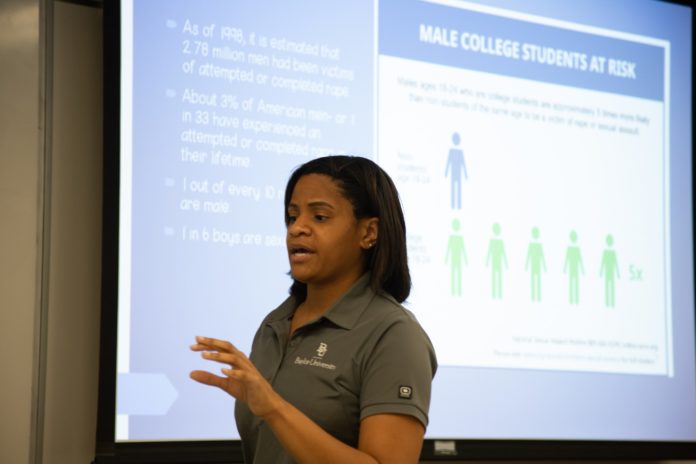
By Matthew Muir | Staff Writer
A sexual assault occurs every 73 seconds in America. At Sigma Gamma Rho’s pRHOtect Yourself presentation, Tracey Tevis explained how to stay safe from these dangers and where to seek support after suffering them.
Tevis, a training and prevention specialist with Baylor’s Title IX department, presented a lecture about how to identify, seek support, avoid sexual assault, intimate partner violence and other related issues at an event hosted by the Sigma Gamma Rho sorority Tuesday night.
Baylor’s Title IX office is one place victims can seek support. Title IX services are available to anyone at Baylor, whether the incident occurred recently or long in the past. Accessing Title IX services does not mean an automatic investigation, but rather begins a conversation about how to best assist the person seeking help Tevis said.
“As long as one or both parties are faculty, staff [or a] student at Baylor, we will help and offer our services,” Tevis said. “A lot of students think Title IX means investigation; no it don’t. That’s what is up to our complainant… they are in the driver’s seat.”
Many individuals or groups on campus are required to report Title IX issues when made aware of them, but the counselling center, health center and university chaplain Dr. Burt Burleson are all confidential resources who are not required to report to Title IX.
Intimate partner violence, which Tevis examined in-depth, extends beyond physical violence. It can also include manipulative or possessive behavior, such as a partner threatening to harm themselves when faced with an impending breakup or obsessively controlling a partner’s social life. Tevis said behaviors like these often build through a relationship and should serve as warning signs.
“Even though it’s not physical, it’s happening,” Tevis said. “[If you go out and your partner] is texting you constantly throughout that night, or they’re saying ‘where are you going?’ and they show up, or they’re like ‘well, you need to put your location on, send me a picture of where you are,’ those are your red flags. And if you can’t have that conversation with them or they get super defensive, that’s [even worse.]”
Sometimes people may not realize they’re in one of these toxic relationships. Tevis said this is where friends have a responsibility to intervene.
“When I would talk to them about it they’re like ‘I don’t want to hear this,’ and it’s still continuously happening. I would keep bringing it up, and bring other friends in,” Tevis said. “If that doesn’t work you can call our office and ask us and we can help.”
San Jose, Calif. junior Abigail Kodamanchilli, Sigma Gamma Rho’s president said she felt inaction from friends is a common problem when trying to address toxic relationships.
“A lot of the time even friends when they do see the signs they don’t go ahead and let their friends know,” Kodamanchilli said. “I feel like a lot of the time people just let things go.”
Stalking is closely related to intimate partner violence, and victims of it can find support at the Title IX office should they want it. While an isolated event likely won’t meet the threshold to be considered stalking, Tevis said anyone experiencing repeated incidents should seek help.
“[Stalking] within our office means if you have a reasonable fear,” Tevis said. “It has to be more than two acts, so if it’s one time it’s usually not [stalking], but if it’s consistent, yes.”
One of the biggest risk factors is alcohol, followed by having a drink spiked with prescription drugs or street drugs like rohypnol and ecstasy. Tevis said one way to guard against these threats is to always guard your drink.
“Easiest thing, take the drink with you,” Tevis said. “If you forget your drink dump your drink out and go get a new drink.”
While they experience sexual or interpersonal violence at lower rates than women, men still face these same issues. Tevis said one out of every 10 rape victims are men, and young men are more likely to commit suicide than women, thus it’s important to make males feel supported by the Title IX system.
“We cannot leave out men. This is [something] I’m really passionate about because within our office when I talk to students, male students too, they say ‘oh, Title IX, that’s for girls.’ No it’s not,” Tevis said.
Tuesday’s presentation is the first event in a series planned by Sigma Gamma Rho. Kodamanchilli said an upcoming event in late March will have a heavier focus on keeping oneself safe.
“So this one was about domestic violence and date rape and stuff like that, but we want to do a second series where we actually have a self defense class where people can learn how to defend themselves,” Kodamanchilli said.





